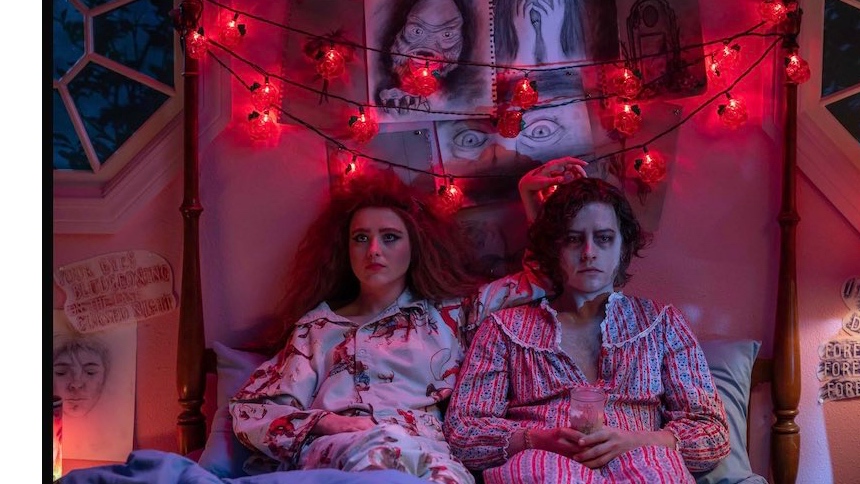LISA FRANKENSTEIN Review: 80s Goth Throwback Disappoints, Underwhelms

Losing a parental figure, biological or otherwise, as a teen can have long-term, lifelong effects, most of them related to the initial, life-changing trauma.
Losing the same parent to an axe-wielding intruder can double or triple that trauma, but in the Diablo Cody-scripted, Zelda Williams-directed Lisa Frankenstein, Lisa Swallows (Kathryn Newton), the aforementioned half-orphan, title character, and protagonist, faces an even worse fate: her zeta-male father, Dale (Joe Chrest), remarries only six months after the unfortunate death of Lisa's mother, and relocates his new, blended family to an entirely new suburb, forcing Lisa, already an introvert and now a traumatized introvert, to readjust to a life she never wanted or possibly needed.
Oddly, the screenplay by Cody (Young Adult, Jennifer’s Body, Juno) treats Lisa’s foundational life-altering trauma as background fodder, an interesting bit of trivia about a half-formed, under-motivated character who, based on that trauma, becomes an instantly sympathetic figure for the audience.
The script references the violent, inexplicable, presumably unsolved murder of Lisa’s mother two or three times at most, seen once in a semi-gruesome flashback from Lisa’s terrified perspective (she hid in a closet), and then never referenced again. Lisa could be any morose, sullen teen circa 1989, misunderstood by her family and peers, and superficially obsessed with death, dying, and goth chic. When she’s bored, she visits a local graveyard, takes rubbings of gravestones, and sighs over-dramatically about her fate.
It's not all bad or negative for Lisa, though. Despite an overbearing, manipulative stepmother in Janet (Carla Gugino, woefully underused), Lisa’s new stepsister, Taffy (Liza Soberano), doesn’t share Janet’s temperament or outlook on suburban life.
In fact, Taffy, an earnest, well-meaning, if slightly dim, cheerleader, seems to care about Lisa’s mental and emotional well-being genuinely and wants Lisa to find happiness in one form or another, albeit through her own constricted, narrow lens (i.e., high school popularity). It's almost enough to hope Taffy makes it to the end credits relatively unscathed.
To that end, Taffy drags Lisa to an unsupervised high-school party filled with the usual cross-section of insular, exclusionist, condescending cliques. Not unpredictably, everything goes sideways for Lisa. Someone spikes her drink, her lab partner takes advantage of her mental state and sexually assaults her, and she ends up back in the graveyard, wishing against hope to join her favorite corpse. All this happens before a storm hits and lightning strikes the unnamed Creature’s (Cole Sprouse) grave, awakening him from almost 150 years of slumber, far worse for wear, desperately needing a shower, a change of clothes, and a few missing body parts.
As Lisa gradually warms up to her semi-uninvited house guest – cue clothes-swapping montage to 80s synth-pop – the tone and direction of Lisa Frankenstein almost imperceptibly gets darker too. Not quite the scientist-creator with a God complex found in Mary Shelley’s seminal 1818 novel, Lisa considers Creature as a roommate and friend first, foremost, and last, not a potential romantic interest.
He makes the perfect friend-guest for a goth teen like Lisa: he can’t speak and grunts constantly, making him the perfect listener for all of Lisa’s woes, including the lit mag editor, Michael Trent (Henry Eikenberry), who, at least for Lisa, qualifies as prime boyfriend material.
Barely winking at, let alone acknowledging, the “Frankenstein” in the title (the Creature enters Lisa’s life almost fully formed, needing only a shower and a couple of body parts), Cody and Williams seem content to parody late 20th-century teen comedies and their reliance on dubious tropes and outdated conventions, but without subverting them in any meaningful way. Even Lisa and her supposed outsized emotions – typical of teens everywhere and in every teen movie from time immemorial (i.e., the ‘80s) – rarely emerge as anything more than a collection of tics, references, and scattershot desires.
Structurally, Lisa Frankenstein repeatedly meanders into incoherence, first-time director Zelda Williams acquits herself well, handling individual scenes with the relatively light touch required by Cody’s script. Likewise, Williams shows facility in directing her cast to give tone-perfect performances, matching Cody’s dialogue line by line, inflection by inflection. The emphasis on over-stylized production design (Lisa and Taffy's life in a pink-colored house with bright pink interiors) can be a distraction at times, though that’s less Williams’s problem than the idiosyncratic moment-to-moment choices Cody's script makes.
With a minimal body count, an indifference-inducing, playing-it-safe PG-13 rating, underdeveloped, frustratingly contradictory motivations for the title character, along with shallow, one-dimensional, stereotypical supporting players, Lisa Frankenstein doesn’t just feel like a missed opportunity, it feels like an entire shedload’s worth of missed opportunities, each one more frustrating than the last.
Lisa Frankenstein opens theatrically on Friday, February 9th, via Focus Features and Universal Pictures.
Lisa Frankenstein
Director(s)
- Zelda Williams
Writer(s)
- Diablo Cody
Cast
- Kathryn Newton
- Liza Soberano
- Jenna Davis







